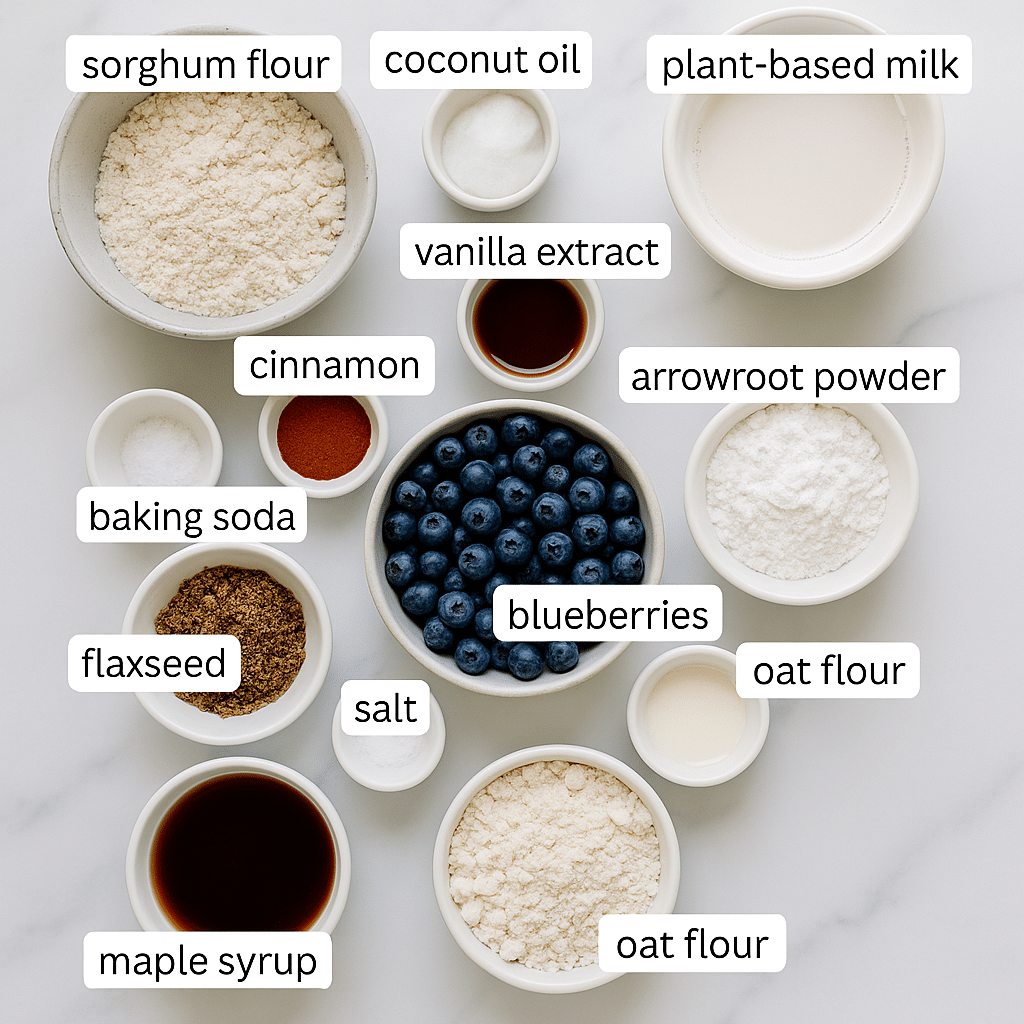Before I even knew the difference between oat and sorghum flour, blueberry muffins were already a weekend tradition in our house. I remember my kids tugging at my apron, asking if they could “taste test” the batter—blue-streaked fingers always gave them away. But once we went fully plant-based, finding that perfect vegan muffin recipe became a real challenge. Either they were too dry, too dense, or just bland. That is—until this one.
This recipe for vegan blueberry muffins with sorghum flour quickly became our go-to breakfast favorite. They’ve got that golden, domed top and a soft, moist crumb you expect from bakery-style muffins, but without eggs, dairy, or refined sugar. And thanks to sorghum flour, they’re also naturally gluten-free, with a subtle nutty flavor that complements the sweet-tart burst of blueberries.

What’s even better is how nourishing these muffins are. Made with wholesome ingredients like oat flour, ground flaxseed, and maple syrup, they’ve become one of those “sneaky healthy” recipes even picky eaters love. I always bake enough to enjoy fresh and tuck the rest into the freezer for busy mornings. And yes, they reheat beautifully.
Whether you’re new to sorghum flour or looking to shake up your muffin game, this recipe brings all the flavor and texture without the dairy or wheat.
Table of Contents
Why Sorghum Flour Makes These Vegan Muffins So Good
Sorghum Flour’s Role in Texture and Flavor
Sorghum flour is a bit of a baking underdog. It’s rich in fiber, naturally gluten-free, and gives baked goods a light, tender texture. In these muffins, it pairs perfectly with oat flour to create a crumb that’s soft yet structured. Unlike some alternative flours that can be gritty or overpowering, sorghum flour in vegan baking keeps things mild and balanced. That’s especially helpful when you want the blueberries to shine.
It also binds surprisingly well when used with a helper like ground flaxseed or arrowroot powder. And for those wondering if it tastes like wheat—nope. It has a slightly earthy, almost sweet undertone that works beautifully in muffins, pancakes, and quick breads.
Perfect Pairings: Oat Flour, Arrowroot, and Flaxseed
This recipe is a great example of how a few smart swaps can work together. Oat flour gives bulk and softness, arrowroot lightens the texture, and flaxseed takes the place of eggs—creating a structure that holds moisture without turning gummy. When mixed with maple syrup, cinnamon, and vanilla, the batter feels just like a traditional muffin batter.
Add blueberries to the mix, and you’ve got something special. Those little bursts of juice balance the mild sweetness and slight tang from the vinegar, making each bite flavorful without being too sweet.
And if you’re into wholesome bakes, check out this refreshing Strawberry Pineapple Smoothie or grab something savory like the Pasta Bean Salad for later.
The Benefits of Vegan Muffins Made with Sorghum Flour
Wholesome, Allergy-Friendly Baking
Let’s talk about why these vegan blueberry muffins with sorghum flour are more than just a tasty treat. For starters, they’re naturally free of eggs, dairy, and gluten, which makes them perfect for sharing—especially when you’re not sure about everyone’s food sensitivities. The combination of oat and sorghum flours brings fiber, plant protein, and a satisfying texture without relying on refined ingredients.
They’re also a great choice for those trying to avoid processed snacks. Sweetened only with pure maple syrup and packed with real fruit, these muffins offer slow-release energy without a sugar crash. I often grab one before school drop-offs or tuck one into lunchboxes alongside something hearty like this Salmon Pasta Recipe for those in the family who aren’t fully vegan.
Ingredient Swaps That Still Work Perfectly
One of the things I love most about this recipe is how flexible it is. Don’t have sorghum flour? Almond flour works well too, as long as there are no nut allergies to worry about. You can also swap the flaxseed with chia seeds in a pinch—just give them a few minutes to soak.

And if blueberries aren’t in season, frozen ones work fine (just don’t thaw them first). You could even try chopped strawberries or raspberries for a little twist. Once, when I ran out of maple syrup, I used date syrup and the muffins still turned out moist and flavorful.
The non-dairy milk choice is flexible too. Almond milk is my go-to, but oat or soy milk will do the job. Just be sure it’s unsweetened to keep the balance right. And if you’re meal-prepping, pairing these muffins with something refreshing like this Strawberry Pineapple Smoothie makes for a breakfast you’ll look forward to all week.
Print
Vegan Blueberry Muffins with Sorghum Flour That Are Moist, Fluffy & So Easy
- Total Time: 30 mins
- Yield: 12 muffins 1x
- Diet: Vegan
Description
Moist, fluffy vegan blueberry muffins made with oat and sorghum flour. Naturally gluten-free and refined sugar-free.
Ingredients
1.5 cups oat flour
½ cup sorghum flour (or almond flour if not nut-free)
2 tablespoons arrowroot powder
1 tablespoon ground flaxseed
1 teaspoon baking soda
1 teaspoon ground cinnamon
¼ teaspoon fine salt
½ cup unsweetened, plain plant-based milk (I use almond milk)
½ cup + 1 tablespoon pure maple syrup
¼ cup melted coconut oil
1 teaspoon pure vanilla extract
1 teaspoon white distilled vinegar
1 cup fresh blueberries + more for topping
Instructions
1. Preheat oven to 375°F and line a muffin tin with silicone cups or grease lightly.
2. In a large bowl, whisk oat flour, sorghum flour, arrowroot, flaxseed, baking soda, cinnamon, and salt.
3. Add milk, maple syrup, coconut oil, vanilla, and vinegar. Whisk to combine.
4. Gently fold in blueberries.
5. Divide batter into muffin cups. Add extra blueberries on top.
6. Bake at 375°F for 10 minutes. Reduce to 350°F and bake 10 more minutes.
7. Cool 10–15 minutes in tin, then transfer to wire rack.
8. Enjoy or store refrigerated for 1 week or freeze for 4 weeks.
Notes
Try almond flour if you’re not nut-free.
Frozen blueberries work—add without thawing.
Chia seeds can replace flaxseed in a pinch.
- Prep Time: 10 mins
- Cook Time: 20 mins
- Category: Breakfast, Snacks
- Method: Baking
- Cuisine: American
Nutrition
- Serving Size: 1 muffin
- Calories: 180
- Sugar: 10g
- Sodium: 120mg
- Fat: 6g
- Saturated Fat: 3g
- Unsaturated Fat: 2.5g
- Trans Fat: 0g
- Carbohydrates: 28g
- Fiber: 3g
- Protein: 3g
- Cholesterol: 0mg
These swaps don’t just make the recipe practical—they give you room to play and make it your own.
Foolproof Steps to Make Vegan Blueberry Muffins with Sorghum Flour
Simple Prep, Big Flavor
You won’t need a mixer or fancy equipment for this recipe. Just a bowl, a whisk, and a muffin tin. That’s part of the charm. It’s all about simple steps and real ingredients. Start by preheating your oven to 375°F and lining your muffin pan. I like using silicone cups—they make cleanup a breeze and the muffins pop right out.
Whisk the dry ingredients first: oat flour, sorghum flour, arrowroot powder, flaxseed, baking soda, cinnamon, and salt. This mix forms the backbone of your muffins—each element serving a purpose. Sorghum flour brings lightness, oat flour gives structure, and arrowroot keeps them fluffy.
In another bowl, mix the wet ingredients: almond milk, maple syrup, melted coconut oil, vanilla extract, and white vinegar. When you pour the wet into the dry, whisk gently until everything is combined. Don’t over-mix—it can make the muffins dense. Once the batter looks even, fold in the blueberries.
Baking That Delivers a Bakery-Style Muffin Every Time
Here’s the trick: bake at 375°F for the first 10 minutes, then lower the temperature to 350°F without opening the door, and bake for another 10. That quick blast of heat helps the muffins rise into those lovely domes.
Once they’re done, resist the urge to pull them out of the pan right away. Let them cool for 10–15 minutes so they can firm up without falling apart. Then transfer them to a wire rack.
If you’re serving them warm, you’ll love how the blueberries burst with flavor and the crumb stays soft. For later, just pop them into an airtight container. They’ll last up to a week in the fridge, or four weeks in the freezer. A quick 10-second warm-up brings them right back to life.

FAQs About Baking with Sorghum Flour
What does sorghum flour do in baking?
Sorghum flour adds a soft, cake-like texture to baked goods without the need for gluten. It has a mild, slightly sweet flavor that complements fruits like blueberries beautifully. In this muffin recipe, it works alongside oat flour and arrowroot to create a balanced structure that holds moisture well.
What is the best flour for vegan muffins?
The best flour depends on the texture you’re after, but a mix of oat flour and sorghum flour is a winning combination for fluffy, moist results. Oat flour is heartier, while sorghum lightens things up. Almond flour and whole wheat pastry flour are also good choices in many vegan bakes, though some may need adjustments for moisture.
Can I replace flour with sorghum flour?
You can replace part of the flour with sorghum, but using it alone may cause the batter to fall apart. It’s best to pair it with a binding flour like oat or use starches like arrowroot. In this recipe, a 50/50 blend of oat and sorghum flour gives excellent results without needing eggs or gluten.
Does sorghum flour taste like wheat flour?
Not quite. Sorghum has a subtle, earthy sweetness and lacks the bitterness or heaviness that some wheat flours can have. It’s great in muffins, pancakes, and even cookies, offering a gentle flavor that lets other ingredients shine.
Conclusion
These vegan blueberry muffins with sorghum flour aren’t just a healthy breakfast or snack—they’re a comforting, flavorful staple you’ll want to make again and again. With their tender crumb, juicy bursts of fruit, and nourishing ingredients, they’re proof that vegan, gluten-free baking doesn’t mean sacrificing taste or texture.
Perfect for meal prep or weekend treats, this recipe gives you flexibility and flavor in every bite. So whether you’re new to plant-based baking or just need a trusty muffin recipe that always works, this one’s got you covered.
Follow me on Pinterest for cozy kitchen inspiration and on Medium for full recipe stories and tips.








